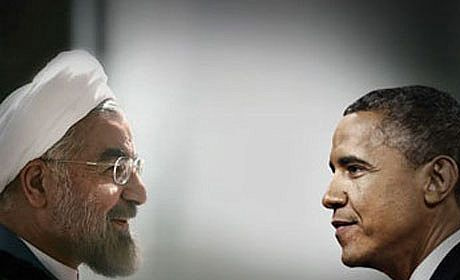How Much Time Do Rouhani and Obama Have?

Anti-US posters were put up and subsequently replaced with other posters which indicated that Iranians will not withstand oppression. Marzieh Afkham, the Foreign Ministry spokeswoman, said that before the Foreign Ministry took any steps, other organizations such as the municipality and other organizations understood that an unlawful act had taken place which had not been coordinated. From this, we can conclude that an influential group within the society opposes President Rouhani’s approach of improving Iran-US relations for certain reasons. This group was able to control the advertisements of the capital for a week. After struggles between this group and the government for a week, this opposition group withdrew and prepared for the anniversary of 13 Aban (the Nov 4 US embassy hostage-taking of 1979). Foreign Minister Zarif considers such incidents temporary and will mention in the next round of talks with US officials that the main principle is to engage in cooperation and reduce misunderstandings between the two countries.
A few days later, in the US, the main officials of the Obama administration such as Joe Biden and Susan Rice and Wendy Sherman held meetings with major Jewish organizations such as AIPAC, the American Jewish Committee, and the Anti-Defamation League to inform them of the content of the negotiations with Iran and the P5+1. These meetings took place before 7-8 November so that the Congressmen would help so that the new round of sanctions, which were to be passed, would be delayed. The organizations noted above have mentioned that the meetings between the US and Iran were constructive and the US would not allow Iran to achieve nuclear weapons capability and these organizations have accepted for the US to continue this sort of diplomacy. On the other hand, Netanyahu, the Israeli Prime Minister, mentioned that the only acceptable outcome of the negotiations is the suspension of enrichment and destruction of the centrifuges. However, many American and Israeli officials believe that such a demand is not possible and Netanyahu has made such a request to disrupt the negotiations.
From the US point of view, oil and banking sanctions will continue until they reach a conclusion about Iran’s behavior, but the ratification of new sanctions will not take place to avoid any disruption in the current positive mood of negotiations. Biden considers not pursuing negotiations with Iran under such conditions as irresponsible and giving leverage to the war-mongering radicals.
With this introduction, we arrive at the question: how much time does the Rouhani government have?; a question that many American analysts have raised in their writings and have discussed extensively.
Each player’s time depends on its conditions and the conditions of the other party. In order to continue its oil and banking sanctions, the US can count on Europe and East Asia to some degree. This is Iran’s weak point. But, in a situation where the Syrian issue is in an unstable state, the US cannot apply a more serious option against Iran. This is considered Iran’s strength. Meanwhile, if we witness any action by North Korea, the US’ condition would worsen.
In general, President Rouhani has time as long as he can run the country with the limited resources he has in hand in terms of basic living needs and prevent domestic protests. If the government succeeds in showing that the international sanctions have been tolerable and if he can increase resistance with an increase in public participation, he could continue the negotiations for the four years of his presidential term. But the Obama administration has only two years left. From the beginning of the third year, when presidential campaigns start off in the US, the government could adopt new policies in order to guarantee the success of the democrats, and this could lead to unknown conditions.
Along with these competitions, if US-Iran relations improve to some degree, the conditions of the two countries would change and both countries would be more prepared to negotiate. Yet, the question remains as to whether enhancing relations with the US is on the government’s agenda or does the government merely seek to solve the problems rooted in the nuclear issue?
In principle, relations between many countries are based on competition and cooperation in which the players raise their concerns and try to solve them in a peaceful manner while interacting and demonstrating a win-win game. In today’s world of international relations, relations between countries are neither merely hostile nor merely friendly. Relations between many countries in Europe, Asia, Africa, and the US reflect mutual interaction while having differences. China and the US are an example of two countries that, while having relations, maintain differences in many fields and maintain their red lines in some cases. The same applies to US-Russia relations and Russia-EU relations.
In this respect, in the past month, different positive and negative views have been expressed by top-level and second-level officials as well as by the media and Friday Prayer leaders, none of which are accurate enough to be implemented. However, both the Iranians and Americans have called on the other party to succeed in this exam. In a question by an ABC reporter asking whether President Rouhani would accept if President Obama invited him, Ms. Afkham, the Foreign Ministry spokeswoman, stated, “What has been considered as a historic evolution in Iran-US relations should first show its results in Iran-P5+1 negotiations; this framework would define the path based on which future decisions could be made.”
This view is equivalent to the American view and both parties have officially mentioned that their next move depends on agreement or deviation in P5+1 talks. Apparently, any action taken outside the P5+1 negotiations that could further clarify Iran and the US’ positions (not necessarily moving them closer together) could have a major impact on the outcome of the negotiations.

